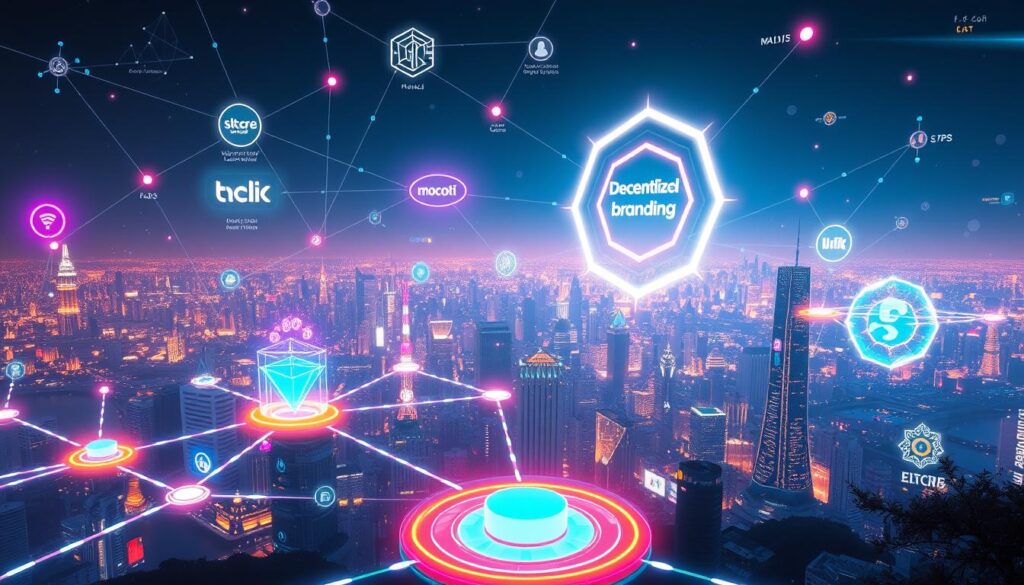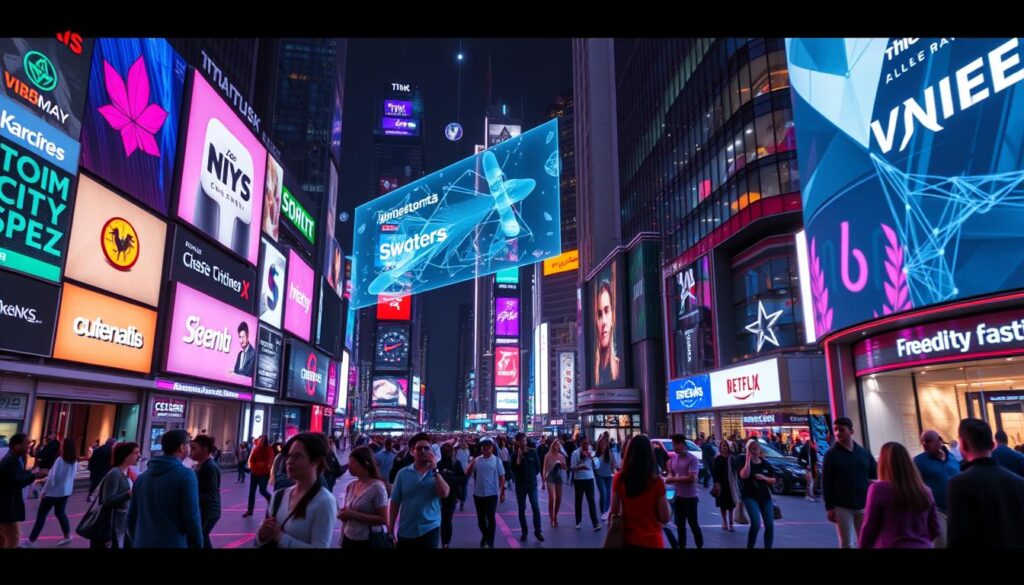As we move towards Web 3.0, how brands talk to customers will change a lot. In his book “Marketing in Web 3.0: Artificial Intelligence, the Metaverse and the Future of Marketing”, Simon Kingsnorth talks about new tech like AI, blockchain, and the Metaverse. He shows how marketers can use these to make brand experiences more immersive and engaging.
This article will look at how Web 3.0 changes branding. We’ll see how it moves from the old Web 2.0 to a new, decentralized, user-focused Web 3.0. We’ll also talk about how brands can adapt and do well in this new digital world.
Key Takeaways
- The transition from Web 2.5 to Web 3.0 is reshaping digital marketing strategies and technologies.
- Personalization is becoming increasingly important in brand interactions, driven by advancements in AI, Metaverse, and blockchain.
- Virtual Reality (VR) and Augmented Reality (AR) are transforming the advertising and brand experience realms.
- Generative AI tools, like ChatGPT, are influencing marketing strategies for content personalization and data-driven campaigns.
- Gamification is playing a significant role in enhancing user engagement through interactive digital experiences.
The Evolution of Marketing: From Web 2.0 to Web 3.0
The internet has changed a lot, and so has digital marketing. Moving from Web 2.0 to Web 3.0 has changed how brands talk to their audience. In Web 2.0, social media and content from users changed how we interact with brands. Now, privacy and protecting data are key in digital marketing.
The Rise of Social Media and User-Generated Content
Social media started in the late 1990s and early 2000s, changing marketing forever. Brands had to make their content more personal and engaging. User content, like reviews and posts, became very important because people trust what others say more than ads.
The Shift Towards Privacy and Data Protection
As the web grew, people realized how important their data and privacy are. This change has made digital marketing more complex. Brands now have to balance making content personal with keeping user data safe. Laws like GDPR have made marketers focus more on being open and getting consent.
The lessons from Web 2.0 are helping us move to Web 3.0. This new era will focus on decentralization, blockchain, and more on privacy. Brands that adapt and use these new tools will do well in the future.

Brands in Web 3: Embracing the Decentralized Revolution
Marketing is changing fast, thanks to Web 3.0 and its new tech. Brands are moving towards a model where users are in charge. This means more control for consumers and a focus on being open and trustworthy.
The Power of Blockchain and Decentralized Networks
Blockchain and decentralized networks are changing how brands talk to customers. They make it safe and clear for users to control their data. This is leading to a new era of web 3 branding, where the balance of power is shifting.
Consumer Data Ownership and Ethical Marketing
In the world of web 3 branding, owning your data is key. Brands must respect this, letting users choose how their info is used. This change is making marketing more open and user-friendly.
Brands need to use blockchain and decentralized networks to connect better with their audience. By focusing on user data and ethics, they can build trust. This is the path to a brighter future in web 3 branding.

Innovative Brand Strategies for Web 3
Brands are diving into the digital world with Web 3. They’re using tokenization and crypto loyalty programs to connect with customers in new ways. These strategies are changing how brands reach out to their audience.
Tokenization and Crypto-Based Loyalty Programs
Blockchain technology in Web 3 brings more trust and control to digital spaces. Brands are making unique digital assets like Non-Fungible Tokens (NFTs). These tokens give customers a special feeling of ownership.
These tokens are the base for crypto loyalty programs. Users get crypto rewards for things like making content, joining communities, and supporting brands.
Non-Fungible Tokens (NFTs) and Digital Ownership
NFTs are big in the digital world. They let brands create special experiences and virtual stores. Customers feel like they own something unique.
This move towards digital ownership opens up new chances for brands. It helps them build stronger bonds with their audience.

Web 3 is changing how businesses talk to their customers. Tokenization, crypto loyalty, NFTs, and digital ownership are leading the way. These tools are making the digital world more open, fair, and focused on the customer.
The Role of Virtual and Augmented Reality in Web 3 Marketing
The digital world is changing fast, and VR and AR are playing a big part in marketing. With the rise of the Metaverse, brands are finding new ways to connect with people in virtual spaces. They’re creating experiences that are both immersive and engaging.
VR marketing takes customers into a digital world where they can explore products and services in a special way. For example, Carraro LAB has built a 3D web lab. It offers cool stuff like immersive marketing and 3D learning. They’ve also made islands in Second Life to show off 3D in games.
AR marketing, on the other hand, adds digital stuff to the real world. It lets customers interact with brands in fresh and exciting ways. This can make people more loyal to a brand. Carraro LAB has made an app called Roma Virtual History for tablets. It uses mobile device sensors to show 3D content.
VR and AR have led to new internet standards like web VR, web AR, and web XR. These changes have opened up new ways for brands to connect with customers. They can use tokenization and crypto-based loyalty programs and even non-fungible tokens (NFTs) for digital ownership.
As the Metaverse and Web 3.0 grow, VR and AR will become even more important. Brands that use these technologies will offer customers unique and personalized experiences. This can help build loyalty and drive success.

Conclusion: Navigating the Future of Marketing in Web 3
The digital world is moving from Web 2.0 to web3, a more decentralized and user-focused space. Brands need to adjust their marketing strategies and use new technologies. This change brings both challenges and chances, asking marketers to focus on being open, ethical, and engaging with communities.
Getting ready for web3 means understanding blockchain, cryptocurrency, and NFTs. These are key in shaping web3 marketing. Brands should be open to trying new things, working with their communities, and valuing data and personalization to thrive in this new marketing era.
Web3 marketing comes with its hurdles, but the benefits are worth it. It can build trust with customers, introduce new ways to engage, and foster community-driven marketing. By embracing decentralization and openness, brands can lead the web3 marketing revolution. This will help them stay relevant and successful in the future.
FAQ
What is the impact of Web 3.0 on branding?
How are brands adapting to the shift from Web 2.0 to Web 3.0?
What are the innovative brand strategies emerging in Web 3.0?
How are Virtual Reality (VR) and Augmented Reality (AR) shaping the future of marketing in Web 3.0?
What are the key challenges and opportunities for brands in the evolving digital landscape of Web 3.0?
Source Links
- https://simonkingsnorth.com/exploring-the-future-of-marketing-embracing-web-3-0/
- https://www.linkedin.com/pulse/exploring-future-marketing-embracing-web-30-simon-kingsnorth-0pu5e
- https://medium.com/coinmonks/the-future-of-marketing-in-web3-2023-2024-92dc24013a49
- https://www.galacticfed.com/blog/the-evolution-of-web-3-0-how-it-reshaped-digital-marketing-today
- https://webcastletech.com/blog/the-evolution-of-digital-marketing-from-web-1-0-to-web3/
- https://medium.com/percs/how-30-brands-embraced-web3-with-impactful-campaigns-fff93cf561d3
- https://www.forbes.com/councils/forbestechcouncil/2024/07/05/web3-where-brands-embrace-a-social-first-future/
- https://www.linkedin.com/pulse/innovative-web3-marketing-strategies-unlocking-power-shyam-singh-dzwwc
- https://medium.com/coinmonks/20-innovative-marketing-ideas-for-web3-marketing-services-be91903b0ded
- https://www.smartinsights.com/tag/marketing-using-virtual-and-augmented-reality/
- https://www.carraro-lab.com/web-3-0-virtual-augmented-reality-internet/
- https://v12marketing.com/marketing/how-web3-and-ar-technology-are-redefining-brand-experiences/
- https://www.linkedin.com/pulse/web3-future-marketing-navigating-decentralized-digital-ojsrf
- https://medium.com/@v.savitskii/marketing-in-web3-navigating-the-future-of-digital-branding-a41d42085c33








